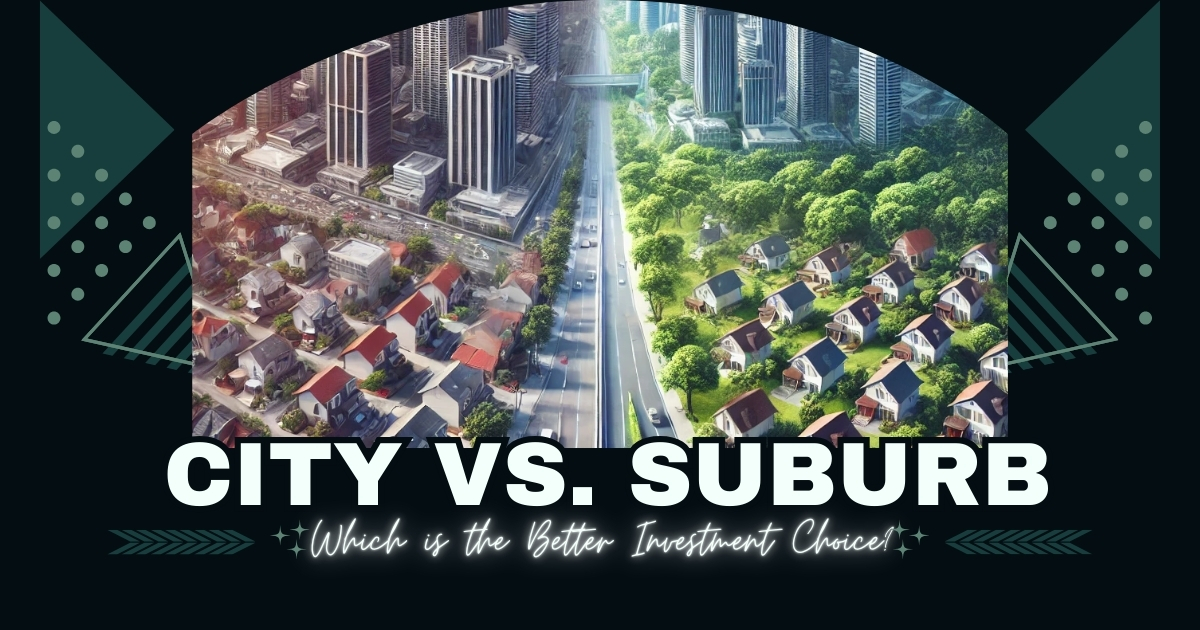When purchasing a property for investment, location is essential. Cities and suburbs are frequently the focus of conflict, and each option has pros and cons. Cities provide a city life with convenient services, fun, and career possibilities. Suburb areas offer a more calm and larger living space, lower housing rates, and easier accessibility to natural facilities.
The exact location of a property strongly determines its worth and opportunity for development. Due to a substantial market for real estate in cities, prices could increase and develop more quickly. On the other hand, there frequently exists more space for expansion in the suburbs, eventually resulting in additional chances for evolution and value. Your goals and interests determine whether you purchase a home in the suburbs or the city. Finding the ideal house for you depends on where you live, whether your priorities are fun and accessibility or privacy and spaciousness. Your routine, job, and level of joy may all be influenced by your choice to live in the city or the suburbs. The decision can be very personal and based on individual desires and situations; every setting has unique benefits and difficulties.
City's Benefits
Huge numbers and strong property needs are standard in cities. Because of this, house prices may increase more quickly over time, making city houses an attractive option for owners. Easy access to facilities like dining options, commercial businesses, and social events is one of the main benefits of city living. For future customers, this might be a significant marketing aspect. It is frequently easier for locals to get employment in cities because of the higher concentration of companies and options for work. The price of houses may increase more quickly due to a greater need for houses in the region.
The reliable bus and rail networks in many cities can be an essential attraction for customers. A city property’s price may increase more quickly if it has good accessibility to buses and trains. It features a broader range of residents, backgrounds, and events that frequently differ from those in the suburbs. This can add interest and satisfaction to purchasing a house in a specific location. Suburban areas are often less sustainable than cities. There are more options for walking, bicycling, and public transit.
Large transport systems, such as vehicles, train stations, streetcars, and bike rental plans, are usually available in cities. This removes the requirement for having a car and makes travel easier. With facilities and places to work within a short walk, travelling is also a practical choice for many people who live in cities; for those who do possess vehicles, transportation, and parking, traffic jams can be significant barriers. This may increase the demand for city housing by attracting additional customers.
Suburb's benefits
Suburban property is often less expensive than city areas. Because of this, they are more affordable for developers or customers on a friendly budget. Compared to properties in cities, suburban properties frequently offer more room. Families or anyone desiring a more peaceful, less hectic life may find this attractive. Additionally, customers who need room for a home business and work from home find suburb residences a better choice.
The suburbs have more playgrounds, pathways, and various environmental adventures. Those who want to be more engaged may find this attractive. There is no dangerous garbage, and crowding may be a significant selling advantage for suburbs. Because of their generally lower crime levels, suburbs are more peaceful and secure locations than cities. As a result, the market and prices for suburban properties may increase. With more significant territory for development, suburbs frequently have more space for growth than cities. The value of houses can eventually develop and grow due to these things.
People in the suburbs depend more on their vehicles for shopping and everyday transportation. The distances between their homes, employment, and facilities are typically longer, and the only way to travel is by bike or car. This results in increased gasoline, servicing, and insurance costs, but it also gives the advantage of one’s vehicle and possibly reduced traffic. Many suburban areas have bigger roads and plenty of facilities because they were built with driving in consideration.
Even if a lovely farm or grassland setting is likely to offer even more comfort, many new homeowners are pleased with the essential escape from the city that suburbs provide. Your everyday activities will likely include more travelling, to be sure, but you’ll also be somewhat more isolated from the city’s anxiety. You have privacy, and there won’t be any disturbances with many people. The suburbs are places where you can relax.
You can locate a fantastic residence that suits all your wants in a location with low criminal activity and good institutions if you’re flexible and wise when purchasing a property in the suburbs. Protection always comes first, regardless of whether you are engaged and having kids or an unmarried individual. Everybody desires to feel safe, even if every neighbourhood is unique. Although there are no assurances, a suburban home is frequently the safest option.
Conclusion
You can choose the option that best fits your needs and objectives for the future by being aware of the significant similarities between the city and suburbs. Whether you prefer cities’ hectic pace or the suburbs’ peace, each offers unique chances to build a happy and satisfying life.




